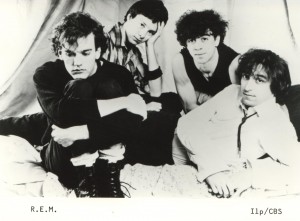 Hearing about R.E.M.’s withdrawal from active duty was like being reminded that it’s no longer the 90s. It’s not like the band hasn’t been active, but who can tell me the name of their hits off “Collapse into Now”?
Hearing about R.E.M.’s withdrawal from active duty was like being reminded that it’s no longer the 90s. It’s not like the band hasn’t been active, but who can tell me the name of their hits off “Collapse into Now”?
Back in ’83, I recall the first review I wrote on them. From a musical era dominated by synthpop, R.E.M.’s “Murmur” was a significant departure, however, even then I lamented what I perceived to be flat production values courtesy of Mitch Easter, and a lead singer who seemed more interested in mumbling his way verse after verse on many songs that contained a less than obvious hook and chorus. I was puzzled over what to make of the band. Still, there was no denying that “Radio Free Europe” was an infectious hit.
For a band coming from Athens, Georgia, I was interested in hearing what else this town could produce. The B-52s were already such a phenomenon that the expectations were high — maybe too high. In the years and releases that followed, anticipating making more sense of the music became as much the fascination as actually enjoying the music. Intentionally obscure and brooding lyrics, sung indiscernibly behind jangly compositions created more mist than mystery about them in my mind.
The music was full of complex constructions, another departure from the golden age of 80s pop. You could listen song after song, waiting for a strong chorus that wasn’t quite there. And yet, it wasn’t a sound or songwriting that I disliked. Instead, as familiarity with their sound grew, the hits that poured out from “Rockville”, “Driver 8”, “Fall On Me”, and “Superman” played from every dorm room turntable and CD player and radio station every hour on the hour. They were a qualified success, but like many fans, I couldn’t put my finger on what was their “it” factor. By their fifth release, that “it” factor crystallized into two massive hits — “End of the World” and “One I Love.” This was the real deal. This was R.E.M. coming out of the gloom for a few minutes of pop fun before retreating back into mist.
 With later releases the production values did improve, but just as they had an undeniable influence on newer bands coming up the ranks, R.E.M. suffered a bit from overplay, generation creep, and even from the largesse of their own success. Maybe their biggest release was “Green”. But after the hits “Song 89”, “Orange Crush,” and “Stand” waned on the charts, interest had moved from R.E.M. on to newer talent. The 90s brought hundreds of new bands into the field with a whole new shift in music. It was the dawn of grunge and I wasn’t the least interest. My interest shifted back to the instrumental and popular music of the 50s and the rebirth of the Cocktail Nation.
With later releases the production values did improve, but just as they had an undeniable influence on newer bands coming up the ranks, R.E.M. suffered a bit from overplay, generation creep, and even from the largesse of their own success. Maybe their biggest release was “Green”. But after the hits “Song 89”, “Orange Crush,” and “Stand” waned on the charts, interest had moved from R.E.M. on to newer talent. The 90s brought hundreds of new bands into the field with a whole new shift in music. It was the dawn of grunge and I wasn’t the least interest. My interest shifted back to the instrumental and popular music of the 50s and the rebirth of the Cocktail Nation.
So here we are two decades later in a music market that is fractured into dozens of demographic segments with the Internet as the top way fans consume their music. It’s not about when but if you hear about a new band, you’ll like them. You’re more likely to hear a new rock or pop tune embedded in a television show or commercial than you are to hear it on the radio. In fact, radio is for older people.
Cue up Stipe’s peace-out statement yesterday about “the skill in attending a party is knowing when it’s time to leave the party,” and I reflected back on what was a very successful career for R.E.M. Like many other fans reading this statement yesterday, I too thought they had broken up long ago. Which is to say that sometime the greater skill in attending that party is leaving the party without anyone noticing.


